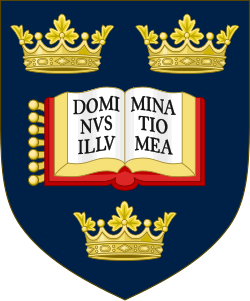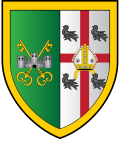Portal:University of Oxford
| Main page | Indices | Projects |
The University of Oxford portal
The University of Oxford is a collegiate research university in Oxford, England. There is evidence of teaching as early as 1096, making it the oldest university in the English-speaking world and the world's second-oldest university in continuous operation. It grew rapidly from 1167, when Henry II banned English students from attending the University of Paris. After disputes between students and Oxford townsfolk, some Oxford academics fled northeast to Cambridge, where they established the University of Cambridge in 1209. The two English ancient universities share many common features and are jointly referred to as Oxbridge.
The University of Oxford comprises 43 constituent colleges, consisting of 36 semi-autonomous colleges, four permanent private halls and three societies (colleges that are departments of the university, without their own royal charter), and a range of academic departments which are organised into four divisions. Each college is a self-governing institution within the university, controlling its own membership and having its own internal structure and activities. All students are members of a college. The university does not have a main campus, but its buildings and facilities are scattered throughout the city centre. Undergraduate teaching at Oxford consists of lectures, small-group tutorials at the colleges and halls, seminars, laboratory work and occasionally further tutorials provided by the central university faculties and departments. Postgraduate teaching is provided in a predominantly centralised fashion.
Oxford operates the Ashmolean Museum, the world's oldest university museum; Oxford University Press, the largest university press in the world; and the largest academic library system nationwide. In the fiscal year ending 31 July 2024, the university had a total consolidated income of £3.05 billion, of which £778.9 million was from research grants and contracts.
Oxford has educated a wide range of notable alumni, including 31 prime ministers of the United Kingdom and many heads of state and government around the world. As of October 2022,[update] 73 Nobel Prize laureates, 4 Fields Medalists, and 6 Turing Award winners have matriculated, worked, or held visiting fellowships at the University of Oxford, while its alumni have won 160 Olympic medals. Oxford is the home of numerous scholarships, including the Rhodes Scholarship, one of the oldest international graduate scholarship programmes. (Full article...)
Selected article
The university's position of Savilian Professor of Astronomy was established in 1619. It was founded (at the same time as the Savilian Professorship of Geometry) by Sir Henry Savile, a mathematician and classical scholar who was Warden of Merton College and Provost of Eton College. He appointed John Bainbridge as the first professor. There have been 21 astronomy professors in all; Steven Balbus, the current professor, was appointed in September 2012. Past professors include Christopher Wren (1661–73) (pictured), architect of St Paul's Cathedral in London and the Sheldonian Theatre in Oxford; he held the professorship at the time of his commission to rebuild the cathedral after it was destroyed by the Great Fire of London in 1666. Three professors have been awarded the Gold Medal of the Royal Astronomical Society: Charles Pritchard (1870–93), Harry Plaskett (1932–60) and Joseph Silk (1999–2012). The two Savilian chairs have been linked with professorial fellowships at New College since the late 19th century. The astronomy professor is a member of the Sub-Department of Astrophysics at Oxford. (Full article...)
Selected biography
Selected college or hall
St Peter's College became a college in 1961, having existed as "St Peter's Hall" since 1929. It is on New Inn Hall Street, on the site of two of the university's oldest academic halls, New Inn Hall and Rose Hall, founded in the 13th century. St Peter's was founded by Francis Chavasse, Bishop of Liverpool, who was concerned at the rising cost of education in British universities. His aim was to enable students who might be deterred by the costs of other colleges to obtain an Oxford education. Its buildings include an 18th-century rectory, which houses the college's entrance and library, and the Church of St Peter-le-Bailey, built in 1874, which is used as the college chapel. There are about 350 undergraduates and 130 graduates. Alumni include the former President of Ghana Edward Akufo-Addo, the Revd W. Awdry (creator of Thomas the Tank Engine), the chef Hugh Fearnley-Whittingstall and the author Mike Carey. Mark Damazer, a former Controller of BBC Radio 4, has been the Master of St Peter's since 2010. (Full article...)
Selected image

Did you know
Articles from Wikipedia's "Did You Know" archives about the university and people associated with it:
- ... that John Weston (pictured) became a published poet after retiring from his post as Ambassador to the United Nations?
- ... that Ivor Bulmer-Thomas, having lost his position on the Historic Churches Preservation Trust (for which he denounced the Archbishop of Canterbury as having "held a pistol to my face while the Dean of Gloucester plunged his dagger into my back"), founded his own, more intransigent, committee, the Friends of Friendless Churches?
- ... that archaeologist Francis Turville-Petre, discoverer of Neanderthal remains in Israel, was portrayed in works by authors W. H. Auden and Christopher Isherwood?
- ... that the highly influential jurist Sir Matthew Hale once said that lawyers were "a barbarous set of people unfit for anything but their own trade"?
- ... that Richard Cordray, the first Director of the U.S. Consumer Financial Protection Bureau, is a five-time undefeated Jeopardy! champion and carried the Olympic Torch in 1996?
Selected quotation
Selected panorama
On this day
Events for 25 April relating to the university, its colleges, academics and alumni. College affiliations are marked in brackets.
- 1868 – The foundation stone of Keble College is laid by Charles Thomas Longley, the Archbishop of Canterbury
Wikimedia
The following Wikimedia Foundation sister projects provide more on this subject:
-
Commons
Free media repository -
Wikibooks
Free textbooks and manuals -
Wikidata
Free knowledge base -
Wikinews
Free-content news -
Wikiquote
Collection of quotations -
Wikisource
Free-content library -
Wikiversity
Free learning tools -
Wikivoyage
Free travel guide -
Wiktionary
Dictionary and thesaurus















